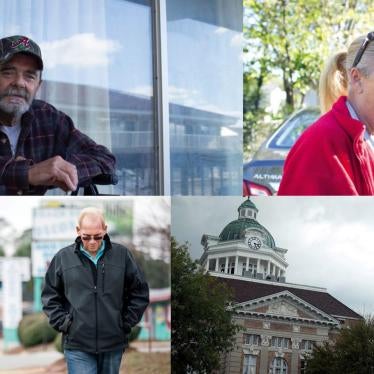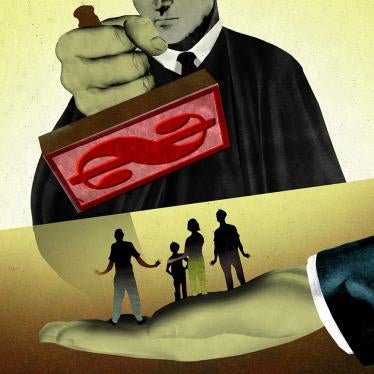(Sioux Falls) – Millions of dollars in public funds are missing in the impoverished Lower Brule Sioux reservation. The Lower Brule Tribal Government should account for the missing public funds and abide by its own rules on openness.
The 111-page report, “Secret and Unaccountable: The Tribal Council at Brule and Its Impact on Human Rights,” documents many of the problems with tribal governance at Lower Brule for the first time. It details how the Tribal Council has diverted millions of dollars in federal funds away from key social programs without explaining how those funds were spent. Human Rights Watch has obtained hundreds of pages of government documents detailing financial mismanagement and possible corruption and is making that information public for the first time.
“Since 2007, Lower Brule’s Tribal Council has lost tens of millions of dollars to mismanagement and possible corruption,” said Arvind Ganesan, director of business and human rights at Human Rights Watch. “This has severely undercut efforts to provide basic services that people across the reservation desperately need.”
The report is being released during a crisis in tribal governance with a split between newly elected Tribal Council members who have clashed with longstanding council members over government transparency and accountability.
The Lower Brule Sioux Tribe is located on a small, extremely poor reservation in central South Dakota on the shore of the Missouri River. Some 40 percent of the local population requires food assistance, and the reservation’s poverty level is almost three times the national average.
The Tribal Council at Lower Brule serves as the legislative and executive branch of the government and is extraordinarily powerful on the reservation. Since 1980, the council chairman has been Michael Jandreau. Neither the local courts nor any other public institution exercise meaningful oversight over the council’s prerogatives.
Over the last two years, the Tribal Council is perhaps best known for its partnership with the Washington Redskins, the National Football League team.
Human Rights Watch found that the Tribal Government’s mismanagement of scarce financial resources has directly impacted basic services many tribal members rely on. For example, US$1.2 million was diverted between 2005 and 2007 from a federally funded program to supply potable water on the reservation. How the money was used has not been explained.
In another instance $2.6 million in federal funds meant for the school system and other programs for the poor were diverted from 2010-2011 for unexplained purposes. Since then the Lower Brule school system has effectively collapsed.
In perhaps the most brazen case of mismanagement, in 2009 members of the Tribal Council set up a series of shell companies to purchase the Westrock Group, a troubled Wall Street brokerage firm. By the time of the sale, the firm had been repeatedly sanctioned and fined by regulators for unethical business practices. Within two years of that purchase, Westrock was bankrupt.
The tribe made this dubious investment with the help of a $22.5 million federal loan guarantee, which the tribe subsequently sold for about $20 million in cash. That money is equivalent to nearly two-thirds of the Tribal Government’s entire annual budget and has since disappeared.
“The Tribal Council has consistently thwarted public efforts to secure information about government finances,” Ganesan said. “Council members’ secretive approach to governance has fostered mismanagement, abuse, and serious allegations of corruption.”
In 2007, tribal members began to openly protest the Tribal Council’s secrecy and mismanagement. In response, the council has withheld virtually all information and documentation about its activities from the public, in violation of the open records provisions of the tribe’s constitution and basic standards of good governance and human rights.
This information blockade has even extended to some elected Tribal Council members who wanted to look into the council’s financial practices, including three new council members that were elected on a reform platform in September 2014.
Indian reservations in the United States are sovereign entities with considerable authority to manage their own affairs. Sovereignty itself is not the cause of Lower Brule’s problems since many other tribal governments have robust mechanisms to hold themselves accountable and protect the rights of tribal members. The lack of any such mechanisms at Lower Brule, coupled with the Tribal Council’s refusal to abide by its own rules and constitutional norms, is the primary cause of the problems documented, Human Rights Watch said.
Even though Lower Brule has a sovereign government, US federal officials have an important role to play in securing accountability on the reservation. Federal officials were aware that the tribal government diverted federal funds earmarked for social programs, but has not done enough to address it. The Interior Department’s Office of Inspector General has, however, has begun to examine why the Bureau of Indian Affairs extended a loan guarantee to the tribe to buy Westrock.
“The federal government can play an important role by helping to investigate and account for the millions of dollars in taxpayer funds that have gone missing at Lower Brule,” Ganesan said. “As a key source of tribal government revenue, federal authorities have the authority – and indeed the responsibility – to demand greater transparency.”
When the three reform council members were elected in September 2014, Chairman Jandreau and two other longstanding council members were reelected. Since the new council was sworn into office on October 1, the new council members have been denied access to government information by Jandreau and the incumbent council members.
The new council has not met to conduct official business since October. At the same time, the previous council secured the resignation of a newly elected chief justice of the tribal court just before the new council took office, and reappointed the incumbent judge who had come in third place in the September election.
On December 12, the new council members held a largely symbolic vote of no confidence against the chair and the other two council members, and voted to remove them from office and appoint the runners-up in tribal elections to their positions. Jandreau’s representative responded by petitioning the tribal court to remove the three new council members from office. The first hearing in that case takes place on January 12, 2015. These events have led to an increasingly tense environment on the reservation.
Human Rights Watch repeatedly contacted Tribal Council members in office during the period these events occurred, and other Tribal Government officials. They refused our requests for information, would not meet with us, and did not comment on these allegations.
“The people of Lower Brule have been deprived for years of information, desperately needed public services, and government accountability,” Ganesan said. “It’s time to end the stonewalling and secrecy and let the truth come out about where their money has gone.”






